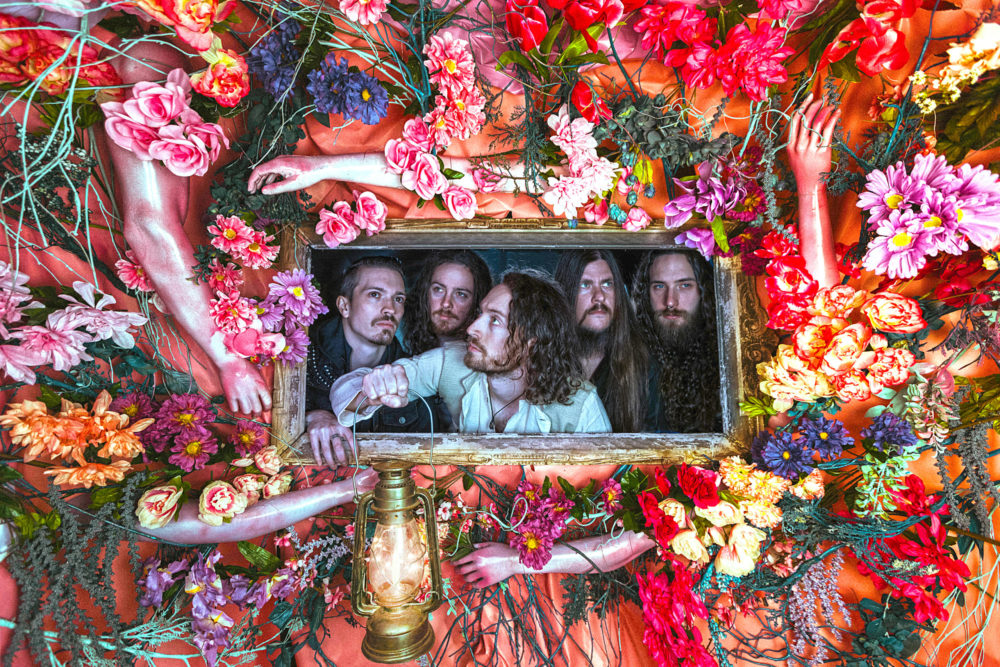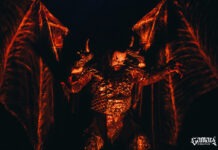Progressive metal act WILDERUN‘s most recently released album, “Veil of Imagination,” is an epic, emotional, and mystical journey through landscapes of the earth and mind, captivating listeners with it’s overwhelming musicianship and songwriting. Bassist Daniel Müller took some time to chat with us about the new album, its songwriting and recording, and a few other interesting things.

Hello. How are you and the band during these quarantined times?
All things considered, doing all right, but things are slowly opening up again here cautiously. At least the weather is nice and you can go outside [laughs].
Are you able to go outside? Are there any big restrictions there?
A lot of shops are still closed that are nonessential and restaurants just started opening up but only outdoor and limited capacity. I mean, in my day-to-day life, I don’t really go out too much into public spaces aside from the woods or whatever, so for me personally, I don’t notice too much of a difference but whenever I go into the store and everyone has to wears masks, that’s when I realize, oh yeah, right, this whole thing is going on [laughs].
Well firstly, I wanted to congratulate you on your re-issue of “Veil of Imagination”; what was the initial response to the album, before you signed with Century Media?
Reactions have been great so far and the people who have been our fans since the beginning seem to be very excited for us and the people who just found out about us now through Century Media’s promotional work seem to be really pleased. I’m very happy and grateful that we have such a great label behind us, one that I’ve followed since I was a teenager, so it’s really quite surreal for me to actually be a part of that family now.
You were an independent band before singing with Century Media?
Yeah for almost a decade. We did everything by ourselves, we kind of had to. The first two records that we recorded, we tried sending it to labels, kind of just sending them packages or emails and that’s just obviously not going to do it, to get any attention. Then the second record we needed to set up a Kickstarter to help us fund it, but then after that record, we were able to record “Veil of Imagination” just with the band’s money, money that we made from sales of the previous two records. So that was the first time we didn’t have to worry too much about whether we could make the record. Now we’re lucky enough that we finally did get the attention from labels and in the end, sign with Century Media. Now at least for the time being, so we don’t have to worry about how are we going to make each record, how we’re going to fund it. That’s a that’s a big weight off of my shoulders.
Do you think that you will have more free time/creativity for writing and composing music now that you’re with a label?
I think so. Yes and no, so yes in the sense that we have the people at the label who are taking care of a lot of this business and promotion, stuff that we otherwise would have had to do ourselves and either didn’t have the time or money to invest to do that, and no because at the same time, all of that involves kind of our oversight in okaying things. Century Media is very good about making sure they run stuff by us before they do it, which is great because we feel like we’re in control of what the image of WILDERUN is being put out there, but at the same time, there is so much more going on now. Even if we’re taking 10% of all the business, the business has expanded quite substantially, so it’s it’s still a lot of work but in the end for more reward.
The band name comes from The Shannara Chronicles. Who came up with that idea?
That was Evan [Anderson Berry] our singer. He is a fan of those books. He always read a lot of fantasy novels, especially earlier on when he had more time, and that region… the WILDERUN was the kind of the the wild west of that world and it was kind of fitting because, at least for the first record, we wanted to create a kind of Americana folk metal -style of sound and thought that name really fits with that goal. Even though we’re not as rooted solely in the folk metal scene now as we were previously, I still think the idea of a wild west kind of sound is very much still applicable because we try and not conform to too many genre stereotypes and we’re trying to blaze the trail for something that is uniquely our own, so I think that it’s still fitting.
On listening, I had a suspicion that there is a common concept or theme to the album. Is that true and, if so, was it planned or were you rather trying to capture a feeling or atmosphere with the music?
More so to the latter. A lot of people will kind of say that “Veil of Imagination” feels like a concept record, which it’s not in the strictest sense of the word. It doesn’t follow one narrative from beginning to end with a story arc or anything, but it’s all focused around similar themes of rediscovery and challenging your own neuroses and the need to understand a world that cannot be understood. And that’s just how I personally like to handle records, to keep some thematic thing. It’s not just a bunch of songs that are unrelated. I like when the lyrics have some sort of tie-together, but I always kind of felt like a strict concept record is really hard to make interesting, to the point where you’re not sacrificing music for the sake of an arbitrary story.
I had the feeling that it was similar to a Wagner opera, or BLIND GUARDIAN’s “Nightfall in Middle Earth” (which is a concept album), in the way that, between the songs, they felt linked together.
I’ve always like that too. “Nightfall in Middle Earth” is one of my favorite records of all time. I always liked records that I can listen to front-to-back. I don’t like skipping around, I want to hear the songs presented in a way that the artist intended. I think by linking songs together in some ways, even if the songs were written independently, you can find ways to bring them together in a way that makes them sound musically cohesive and gives it the feel that you can’t separate these songs. I always find this really funny, when people ask if songs were written together… no, they were actually separate, but you can work it to fit. It has to be intentional though, it has to be good.
The single, “Far from Where Dreams Unfurl,” is kind of the middle of the album. I really liked that idea, that you didn’t start with the first song and that you really need to listen to everything.
I never liked that when I pick up an album, I hear the single and I’m like, “Oh I love this, I need to get the album,” and I put on the album and it’s the first song I hear. I want to immediately dive into something new, working my way to that single, so that when I hear it, it’s refreshing and I know the song, I can sing along to it. Then when the song ends, now there’s the rest of the album to explore. It’s a good way to ease the listener into their first listening experience with the record, especially for one that’s more dense and complex.
Now, you all met in Berkeley and you all have a musical background. Did that help write music, or do you write from feeling and try to develop it from there?
For me it definitely helped. I think there’s a lot that I learned there, especially in regard to the technological aspect using orchestral samples and sound design. These are things that would’ve been very difficult for me to learn on my own. The songwriting aspect is a unique situation where you go and you study music, you study composition, and you get a better understanding of things and you know how to articulate them. But when you when get to a certain point, you can’t help but think too much of the theory as you’re writing or even listening to other music and it starts to feel like you might be losing that spontaneity and that deep fire within that inspires you, so it’s a bit of a balance. I always find myself at a point where I learn something, I internalize the theory of it, and then I try to figure out how to not think about it anymore. I don’t want to think about theory while I’m writing. I want to think about music [laughs].
Do you write as a collective or does one band member have the initial idea? Or do you come up with riffs and ideas individually?
Up until now it’s been all, for the most part, Evan coming up with the song structures. He’ll demo them out on his computer with MIDI drums and some quick keyboards or whatever just to get the point across, sends it to us, and then we will individually look at it. I’ll look at it and figure out what are my bass parts going to do. I write those completely independently and bring those completed lines to Evan and we all then work together to fine-tune everyone’s parts and make sure they work with the song as a whole. So it all starts with that skeleton that Evan sends to us, but then as the process continues, it gets increasingly more collaborative, especially by the time we’re in the studio. It’s very much, okay we know where the songs are going and we know how this is all going to work, but how are we going to dress it up and how are we going to present it and everyone has unique ideas of how to do that. We’re just starting to experiment with some other people in the band writing some core ideas and kind of working it backwards, seeing if we can do that in a way that it still sounds like WILDERUN but maybe has something new and unique to it and might inspire something for a new record.
Were there any songs or ideas that didn’t make it onto the release?
No, I think for almost every record, every song that’s on the record are the ones that we had. I’ve always liked the idea of writing a bunch of material and then cutting out the fat, so to speak, but I think with WILDERUN song structures, they’re so long and evolving that as we write, we’ll hit a certain point where we kind of hit, okay this is about album length, and then the further we write, the more it seems to sound like a different record. So we kind of know that we need to cut it here because these songs were usually all written in a fairly similar time period and that seems to make the biggest difference.
Do you ever reuse the songs or parts that you cut off?
Yeah, whether we take that song and rework it into a new setting for a new record, I mean that’s not something we’ve done, although we have these kind of rough song ideas that are floating around that we might end up using. Sometimes we just scrap them for parts, like okay this this one riff is really cool so let’s see if we can work that in somewhere.
Regarding the artwork, the cover is both beautiful and thought-provoking. Could you give us a little detail on who did the artwork, how it was designed, and how it fits the album?
The artwork was done by Adrian Cox. He’s an artist who was a friend of ours since I think the “Sleep at the Edge of the Earth” record and he had posted some stuff on our page before and we poked through and thought there was some interesting stuff. It’s got this unique, colorful take on a dark vibe, which I really liked, so we contacted him to do an original piece for “Veil of Imagination,” but at the time he was far too busy with his own art show that he was doing and he said, “Here’s some other pieces that I have. If there’s anything in here that’s that interests you let me know and we can we can adjust it to fit your parameters.” So we flipped through some things and then we saw that one and almost immediately thought that has to be the album cover. There was just something that was so uniquely fitting to it and then it happened to be that he was listening to a lot of WILDERUN music at the time he was working on that series of artwork. It was, funnily enough, very fitting.
You had planned an upcoming tour to support the album but it was postponed due to the lockdown. How badly did it affect the band and what are the plans going forward from here?
Luckily, financially it wasn’t too hard on the on us because we all rely individually on our own separate income sources for ourselves personally. But we all felt really bad that the fans didn’t get to see a tour that they were very excited for. We were going to go on tour with our friends in AETERNUM who also just released a record this year that is fantastic. So now we have to figure out what do we do in the meantime. We released the album at the end of last year, self-released, and did a small 1-1½ week run after that, and now we just have this endless time with no shows, which is a very poorly-timed thing when we’ve just released an album that we want to promote. So right now we’re kind of working on when can we reschedule that tour. We do want to do it, it’s just a matter of when, but luckily, at least for us, we got an opening slot on the upcoming SOILWORK tour in Europe next year. So that’s going to be something to look forward to. Then we’ll see if we can fit in the AETERNUM tour in the same year as well.
During this time you performed a quarantine session. Do you intend to do more sessions like that? What is your main focus right now?
I would like to. The question is whether we have the time. Right now we’re kind of in the thick of working on a new record and we’d ideally like to have that record out at some point next year because we were far enough along in the core songwriting of it that I think that could be possible given that we can get into the studio early enough next year. That’s kind of our priority right now, but if we find that things are going very smoothly and we have some more free time, I’d love to do one of the songs off of the “Veil” re-imagined into an acoustic setting, since I think that would be a very unique approach to that, especially an album that’s as big and bombastic.
Do you stick to the shorter tracks in your live shows or will we be able to hear songs like “The Unimaginable Zero Summer” live someday?
We certainly don’t shy away from playing long songs. I mean “The Dying Californian” was one of our longer songs that we played a couple times. We just started recently playing that again in the last few shows that we’ve done. It was a little tough, especially if you have an opening slot where let’s say you have 30 minutes to play a set and one of your songs is 15 minutes long. Now that we’ve got three albums under our belt, we like to have a set that has at least one song from every record, so it does take up some time. I’ve always wanted to play the “Ash Memory” suite from the second record, which on the whole I think is somewhere between 20-25 minutes, so that would be really cool. I have no problem playing a song for 25 minutes and I’m sure there’s a lot of people who, like yourself apparently, would love to hear it. Headlining slots are better for that. You’ve got more time to bust out these monster tracks.
How do you approach playing the new songs live? Do you need to rearrange them at all due to their complexity?
Yes, here and there. We try not to and really the only reason we’ve ever rearranged a song is to make it so… let me back up here. We play with a click in our drummer’s ears right now. We all play along to the drums, so whenever we have this moment of silence where there’s no drums and maybe just guitar strumming or something, he’s keeping time on the hi hat or right cymbal or something and that’s all well and good for 30 seconds or whatever, but if you have a 3-minute section like that where you want the acoustic guitar to be in sync with the orchestra but there’s no drums, that hi hat’s going to get annoying real fast. What we’ve just started implementing now – and we have yet to fully test it – is just having an in-ear system where we all hear the click in our ears. Now that we have that going – and hopefully it works smoothly – we can actually play whatever song we want to and the parts where there’s 3-4 minutes of just guitar and orchestra, we can do that and our drummer can just sit back and not worry about keeping everybody in time.
Well that’s it for my questions! It was really a pleasure to talk to you and I’m really enjoying the album. Thank you for your time and I wish you luck and hope that we will see you on stage soon!
I hope so too. I’m itching to get back on stage so hopefully sooner rather than later. Thank you!
Interview by Peter Jerman
Musicalypse, 2020
OV: 415
Links
Recent posts
[recent_post_carousel design=”design-1″]
Related posts
News post





